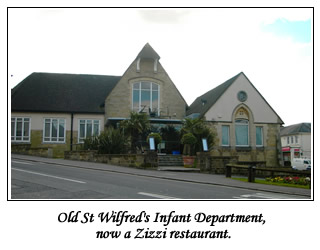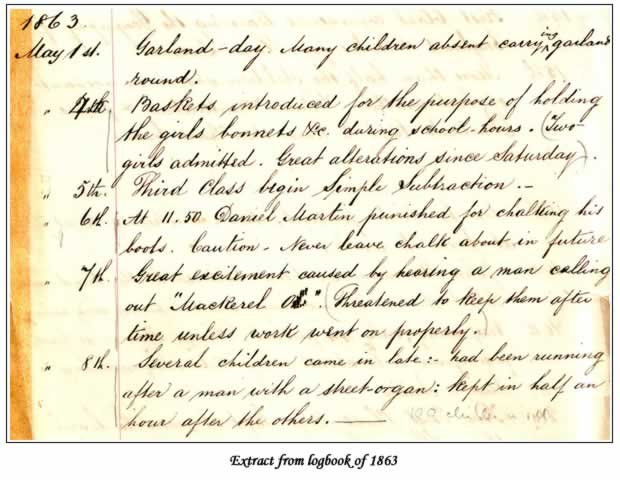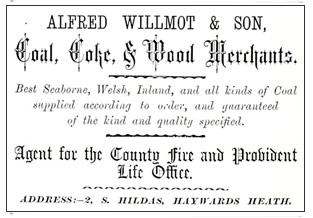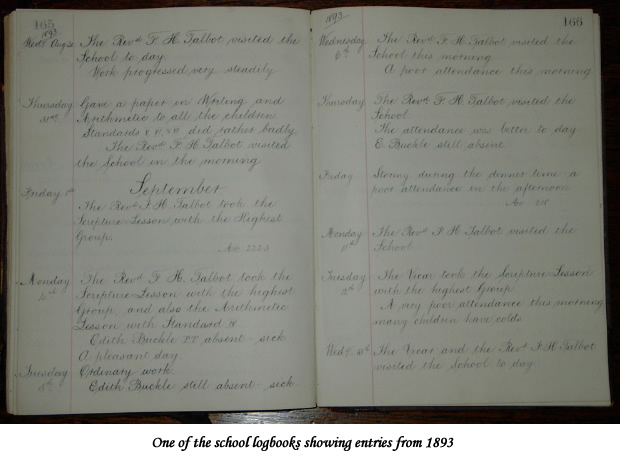In the archive cupboard at St Wilfrid’s School, Haywards Heath, East Sussex, is a shelf of old logbooks in varying states of repair, together with some old school exercise books. The logbooks were kept by the past Headmasters of the school and date from 1863.

There are a wide range of entries over the years, some of which are useful to family historians; children are rarely named in later volumes, but in the earlier ones there are lists of children admitted or leaving, names of those suffering from illness and therefore not in school, those who have caused problems, got up to mischief, or injured themselves. Summaries of Inspectors reports are always included, as are the examination results of the pupil teachers.
The following is an early weeks’ entry outlining the rules for the ‘School pence’ payable:-
31st August 1863 Recommenced School after one month’s holiday. 90 present. School pence 10s 0d. Higher rate of payment rendered necessary by introduction of the New Code; – in future payments as follows – 2d for 1. 4d, for 2:- 5d for 3, 6d for 4 and not more than 6d from one family: ½ d to be returned to those paying 2d if present at every attendance during the week.
1st September 1863 Admitted two new boys from Brighton between 12 & 14 years of age, neither of them able to read words of two letters, indeed one hardly knows his letters.
2nd September 1863 Two ladies visited the school to make inquiries after a purse they had lost; nothing known about it – William Waller a fresh comer from Catt’s School very troublesome obliged at last to punish him.
3rd September 1863 School very quiet – the second class girls kept for a lesson in Arithmetic. Mrs Oldham pays for 1 years schooling for Stoners & Maynards £1,,1,,8. and promises to pay for the Orams & Mitchell.
4th September 1863 School thinner on account of the damp morning. Make inquiries respecting James Johnson’s attendance; having attended 1 ½ days this week and always very irregular. Returned 1s 6d for regular attendance.
I have been given permission to take these books home to read, and have gradually been transcribing them for use by the children, to learn about the history of their counterparts from earlier times.

Insights into school life depend entirely on the character of the headmaster of the time; some entries are as dry as dust and very repetitive while others, such as those by Alfred Willmot, record official school business and the daily life of the school, together with his observations on the children, his frustrations and difficulties with the parents, staff and clergy.
Alfred was born in 1843, the son of a Croydon shoemaker, and this was where he first became a pupil teacher, then a certified teacher. He was appointed Headmaster in Haywards Heath, taking up his post on 2nd May 1865. He recorded the event proudly in the logbook:-
“I, Alfred Willmot took charge of St. Wilfrid’s National School Hayward’s Heath”.
He found that he needed to supplement his Master’s income to support his young family: He was an enumerator for the 1871 census for District 5, Cuckfield (which covered the new railway town of Haywards Heath), took in a lodger (another teacher), and also developed another unlikely occupation, a coal merchant.
On this day he was particularly popular with his pupils:-
12th October 1864 St Wilfrid’s day. Assembled in the morning also in the afternoon, but after distributing 5lbs of ‘bulls eyes’ and giving three cheers for nothing in particular all were dismissed ½ an hour earlier.
However, he would not stand any nonsense:-
29th November 1864 Worked second class in tables this morning. Four children running about the school this dinner hour, threaten to turn them out in the dinner time if this happens again.
Good attenders had an annual opportunity to go on the school treat:-
20th December 1864 Attendance a little better this week on account of the notice given of school treat, proof that some hunger more for food for the body than food for the mind.

On another occasion a hungry child (or perhaps a greedy one) had been at another pupil’s food:-
7th February 1865 Rhoda Chatfield complains that her dinner basket has been rifled two or three times. Cannot discover the offenders. Warn them of consequences (spiritual & temporal) of theft.
The logbooks of this period also record the reasons why children left the school, an invaluable source for family historians:
18th May 1865 The following children have left school and have been taken off the registers today. Ellen Maynard to go into Miss Neale’s service, Alfred Upton to go into Miss Kenward’s service, Charles Tidy to go into Mrs J Oldham’s service, Edwin Goldsmith to go to work at the college at Pax Hill, Ellen Mitchell because her mother thinks her such a big girl, Emily Upton to go to Brighton, G. Allen to work as a cow-boy at Mr Button’s, Arthur Bell no defined reason, Ellen Colvin taken off for non-attendance, Thomas Deal left the neighbourhood, Ben Brunton because the distance to school is so great from his house, Sarah Brunton same reason and Charles Winder left the neighbourhood.
As always, boys will be boys, and Alfred had a fair share of disciplining to do, but rarely mentions physical punishment; sometimes he would lock the offender in the school porch for a time, or kept them behind to do extra work. Here are three such incidences:
17th July 1865 D. Harland & Geo Muzzle firing off gunpowder in dinner time. Kept in 1 hr ½.
18th September 1865 Boys punished for throwing stones on the roof of the school and breaking the tiles.
14th May 1866 Punished W Waller and A Cook for throwing stones at a blind horse.
A certain amount of social welfare was also going on. Cleanliness was next to Godliness in Victorian times and with it being a church school they were particulary scrupulous:-
9th October 1867 Charles Alexander so dirty that he was washed at school. Says that his mother does not have time to wash him.
28th January 1868 General inspection made of hands, Patching’s were discovered to be perfectly black. Fourteen washed and told to shew themselves to their parents.
Although, a poor unfortunate who started his day clean in 1869 didn’t fair so well:-
“Arthur Purvey spills ink on the floor, wiped it up with his handkerchief, cries and rubs his eyes with his hands. Presents a frightful appearance. Says, ‘teacher told him to'”.
Unfortunately it was the day when the school Inspector was in, although no mention of the incident appears in the inspection report
Alfred notes that some children emigrated and there are references to America throughout the logbooks, but these almost always refers to a settlement between Haywards Heath and Lindfield known as ‘America’ which was founded by the Quaker, William Allen, as a model community.
However, these girls went all the way to the United States:-
22nd June 1868 Albert Ford admitted. Miss Wyatt and a lady visit the school this afternoon, distributed ‘bulls-eyes’ to the children. Hear that Ellen and Elizabeth Simmons have gone to America to the Salt Lake (Mormons).
In 1870, the logbook becomes less detailed and contains more facts on attendance, and school pence, although he records a letter from a parent:
5th September 1870 Fred Mitchell punished for telling a lie. In afternoon received the following from Mrs Mitchell –
“Mr Willmot, I send Fredy to school to learn to rede [sic] and rite [sic] and not to be knocked about with the cane and sure as you do it again, so sure you shall pay for it and if he did tell a story, it is no more than you used to do when you were a boy, Mrs Mitchell”.
The above sent to the Rev. Wyatt who expelled the two children.

My final example from the logbooks concerns Leonard Mitchell, who was the elder brother of my husband’s great grandfather Elisha. Elisha is only named in passing, but the varied school career of Leonard drew more of Mr Willmot’s attention.
26th September 1870 Augusta Chilcott admitted. Henry Billinghurst admitted. Leonard Mitchell punished for playing in Church on Sunday.
24th May 1871 Found one of the window ventilators broken made enquiries and found that it was done by Leonard Finch and Leonard Mitchell. Not punished until the matter is referred to the Rev. R. E. Wyatt.
11th September 1871 Children absent:- Leonard Mitchell working – harvesting.
Leonard was nine years old, and living on Oathall Farm with his parents and two younger siblings. They appear there on the 1871 census, in Mr Willmot’s handwriting in his capacity as enumerator.
Mr Wilmot continued his record of him:-
6th November 1871 Leonard Mitchell gives notice of future absence to go to work.
22nd April 1872 Leonard Mitchell comes again after an absence of 23 months at work.
23rd April 1872 Drill. Vide 16th April. John Gaston pupil teacher allowed half-holiday to go to a cricket-match. Leonard Mitchell ½ an hour late, said he had to go to shop for cheese & c & c. Sent to his mother and found it a lie. Caned him.
7th May 1873 The Rev. Whittington absent ill. Attendance excellent although very wet and stormy. Drill in School. Boys from infant school taken in the squad. George Upton, George Illman and Edward Westridge not able to drill from bodily defects. Philip Woolgar, Leonard Mitchell & Charles Talmey caned for swearing during drill.
26th September 1873 Masters Work: First Class the whole day. Copying repetition into copy books. Rev. Whittington asks information concerning Leonard Mitchell. Rev. Wyatt calls in afternoon about the same boy who has gone to Cuckfield school. From the commencement of the school year his attendance has been as follows – 1 wk absent, 3 wks present, 2 wks absent, name taken off, 18 wks since, made no application to be admitted.
The annual school treat was about to take place, and children would only be allowed to go if their attendance levels were good enough.
4th June 1873 Asked children which they would prefer for a school treat, to go to the Crystal Palace or to Bolnore. Unanimous in favor [sic] of the Palace.
Crystal Palace had moved to Sydenham in 1854 and was an easy journey by rail. Bolnore, being in Haywards Heath, was a short walk away and was the home of school benefactor, Lady Dealtrie, who opened her garden for charitable events.
18th June 1873 Leonard Mitchell put in an appearance at the railway station, sent home again. [Day of] School Treat.
Poor Leonard, he knew the rules, but it wasn’t his fault that he had to go to work. In later life he went on to work in a brickyard, when his family were living in the colony previously mentioned, known as ‘America’. At the time of the 1891 census he appears in Kent, with a wife and two children and thereafter the family vanishes, abroad maybe, hoping for a better life.
Alfred continued as a schoolmaster until at least the 1891 census, although he left St Wilfrids in 1882. By 1901 he was still living in Haywards Heath and described as retired.
Anyone who thinks that a family member may be entered in the older logbooks can contact the school at office@st-wilfrids-haywardsheath.w-sussex.sch.uk with a name and approximate date for a search. This service is currently free although is under review.
Jill on the A272
© Jill on the A272 2008
SOURCES
St Wilfrids CEP School logbooks
Directory for Haywards Heath published by Charles Clarke 1881
Re-discovering America in the Middle of Mid Sussex’ by Debby Matthews